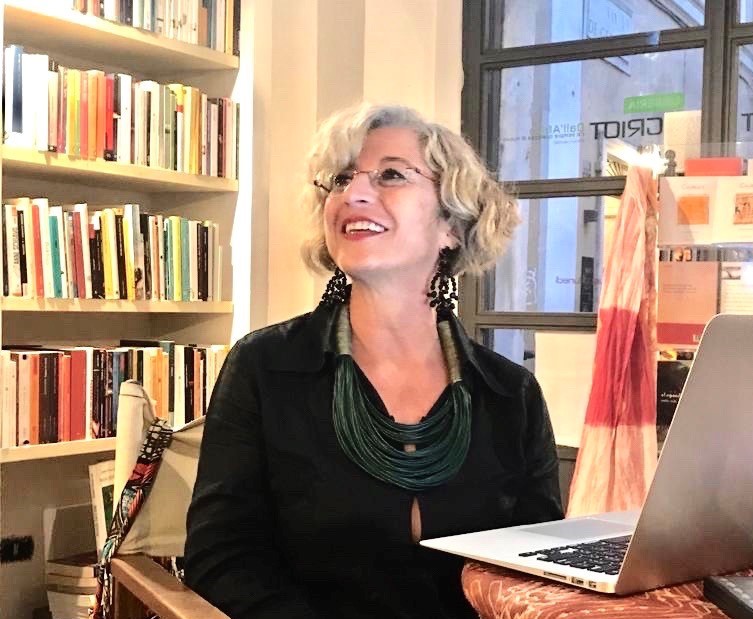Dr. Cristina Lombardi-Diop

TITLE/S: Senior Lecturer in Modern Languages and Literatures, Associate Faculty in WSGS and the Loyola Graduate School.
Specialty Area: Postcolonial Migrations/African Studies/Italian Studies/Global Feminisms
OFFICE #: Crown Center for the Humanities, 217
Phone: 773.508.2379
E-mail: clombardidiop@luc.edu
CV Link: https://cristinalombardidiop.academia.edu/
About
Cristina Lombardi-Diop holds a joint appointment in the Modern Languages and Literatures Department, and the Women's Studies and Gender Studies Program. Her career as educator and scholar has spanned over two continents. She was born and raised in Rome, where she completed her undergraduate education with an Italian laurea (Magna cum Laude) in Modern Languages and Literatures; she then arrived to the United States as a Fulbright Scholar to complete a terminal Master Degree in African and African American Studies at Yale University, before continuing for a Ph.D. in Comparative Literature at New York University. Before being hired by Loyola, Cristina has taught at the American University of Rome, University of California, Berkeley, and Northwestern University.
Cristina is the recipient of two scholarly prizes (Yale University and Northwestern University) and two book prizes (Nonino Prize and the Prize of the American Association for Italian Studies). In 2014, she was nominated as finalist for the prestigious Premio di Divulgazione Scientifica awarded by the Italian Book Association.
Research Interests
As a migrant academic, fluent in four languages, Cristina has for long been interested in the aesthetics, the imagination, and the expression of subjectivity of migrant narratives as found in literature, films, and the arts. She has published widely on such topics as white colonial femininity, Black Atlantic and Mediterranean connections, race and European identity, and African women’s diasporic literature in Italy.
Courses Taught
- HONR 201 - Encountering Africa
- LITR 200 – Masterpieces of European Literature
- LITR 202- Modern European Novel
- LITR 264 – Italian Film Genre
- UCLR 100 – Interpreting Literature
- WSGS 101 – Introduction to Women’s Studies and Gender Studies
- WSGS 201 – Contemporary Issues in Women’s Studies and Gender Studies – Gender and Migration in Contemporary Europe
- WSGS 330/401 – History of Feminist Thought
- WSGS 380/497 – Queer Theory
- WSGS 450 - Global Feminisms
- WSGS 498 - Practicum
Selected Publications
Books
- L’Italia postcoloniale. Lombardi-Diop, Cristina and Caterina Romeo, (a cura di). Firenze: Le Monnier Università, 2014. https://ecommons.luc.edu/facultybooks/112/
- Bianco e nero: Storia dell’identita’ razziale degli italiani. Co-authored with Gaia Giuliani. Florence: Le Monnier, 2013. Recipient of the 2014 Prize of the American Association of Italian Studies (AAIS). https://ecommons.luc.edu/facultybooks/74/
- Postcolonial Italy: Challenging National Homogeneity.Lombardi-Diop, Cristina and Caterina Romeo, eds. New York: Palgrave MacMillan, 2012.
- Smuovere il centro. Lottando per le libertà culturali. Lombardi-Diop, Cristina. (a cura di). Rome: Meltemi Editore, 2000 (Italian translation of Ngũgĩ wa Thiong'o’s Moving the Center: The Struggle for Cultural Freedoms, 1997). Recipient of the 2001 Nonino International Prize.
Journal Special Issues
- Afrofuturism: Spaces, Bodies, Imaginaries, Aesthetics, Afrotopian Thinking. Special Issue of Root&Routes: Research on Visual Cultures. Vol. IX, n. 31, September -December 2019.
- Postcolonial Europe. Special Issue of The Journal of Postcolonial Studies, Taylor& Francis, Vol. 18,2015. Issued in July 2016. Co-edited with Caterina Romeo. http://www.tandfonline.com/toc/cpcs20/current
https://www.roots-routes.org/year-ix-n31-september-december-2019-afrofuturism/
Articles
- “Filial Descent: The African Roots of Postcolonial Literature in Italy.” Forum for Modern Language Studies. Vol. 56, n. 1, January 2020, 66-77.
- “Roma-Asmara. A Postcolonial Archeology of Colonial Spaces.” Architecture in Asmara.Colonial Origin and Postcolonial Experiences. Peter Volgger and Stephan Craf. ADomPublishers, 2017, 271-277.
- “Transoceanic Race: A Postcolonial Approach to Italian American Studies.” Transcending Borders, Bridging Gaps: Italian Americana, Diasporic Studies, and the University Curriculum. Vol, 10, 2015, 83-95. New York: John D. Calandra Italian-American Institute.
- “Spotless Italy: The Ubiquity of Whiteness in Fascist and Post-War Consumer Culture.” California Italian Studies. 2, 2011. Eds. Albert R. Ascoli and Robert Stam. <http://escholarship.org/uc/item/8vt6r0vf>.
- “Ghosts of Memories, Spirits of Ancestors: Slavery, theMediterranean , and the Atlantic.” Recharting the Black Atlantic: Modern Cultures, Local Communities, Global Connections. Annalisa Oboe and Anna Scacchi. London: Routledge, 2008. 162-180.
- “Selling and Storytelling: African Autobiographies in Italy.” Italian Colonialism: Legacy and Memory. Jacqueline Andall and Derek Duncan. Oxford, Bern: Peter Lang, 2005. 217- 238.
- “Pioneering Female Modernity: Fascist Women in Colonial Africa.” Italian Colonialism. Ruth Ben-Ghiat and Mia Fuller. New York: NY, Palgrave MacMillan, 2005. 145 – 154


